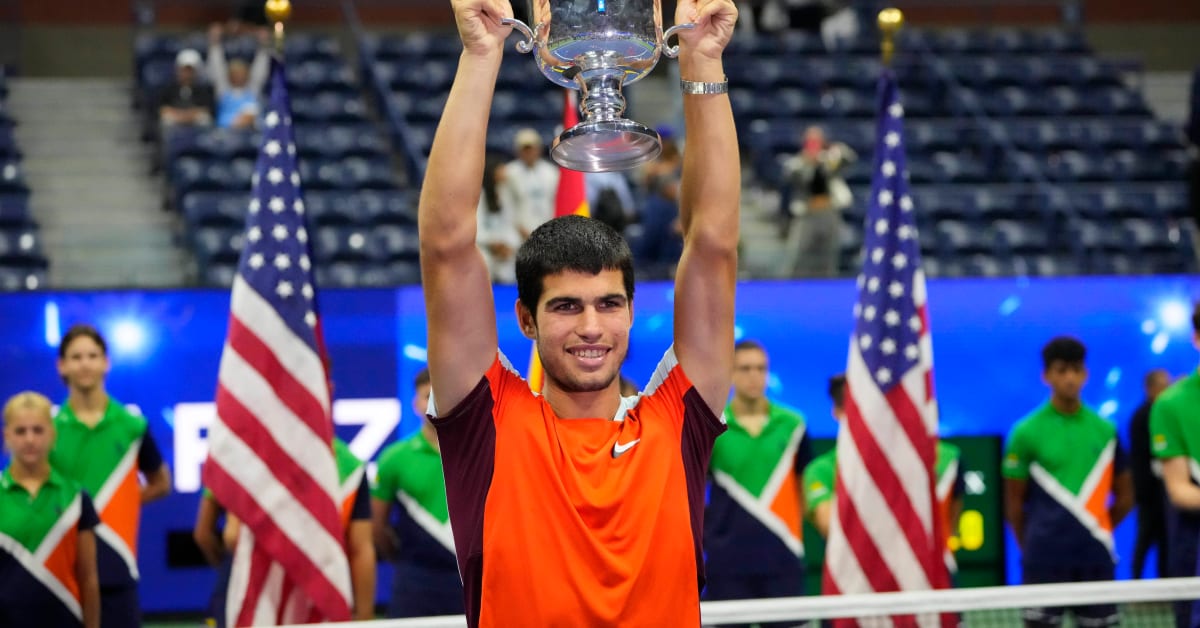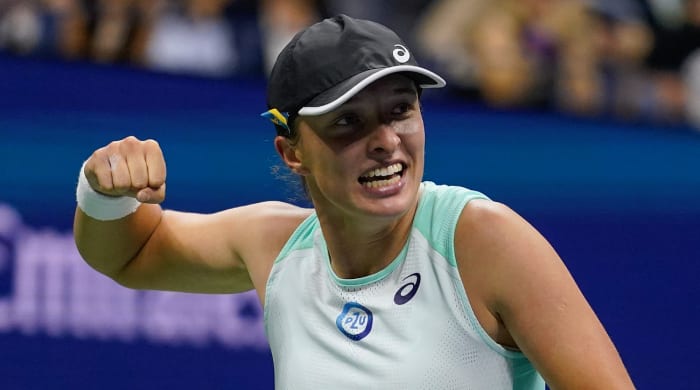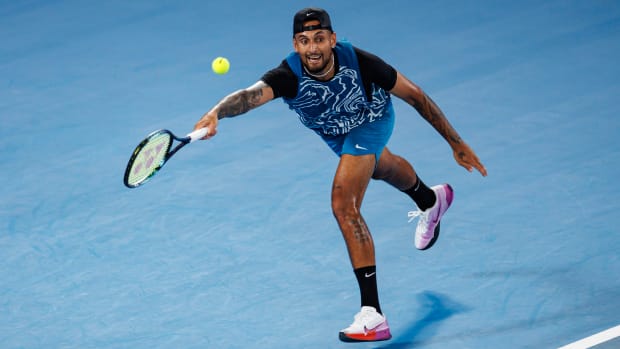The U.S. Open Needs to Fix Its Late-Match Problem
A final wrap of the 2022 U.S. Open with some spinning ahead…
• FWIW here are the 50 Parting Shots
• Respect the Hustle Award goes to Michael Lewis who wrote for 21 (!) different outlets during the U.S. Open. Here’s a sample.
• I was asked to link this speech and sheepishly will comply.
Mailbag
Hi Jon,
I hope all is well. Is it not wild that as of the time of me writing this, there’s a statistical possibility of Ruud or Alcaraz leaving the US Open as the #1 ranked player on the ATP tour?
Best, LT, Toronto
Obviously this was written a few days in advance of the final. But it gives us a chance to point out A) the impact of the ATP stripping Wimbledon of points, B) a very strange year. Djokovic WON more majors in 2021 than he played in 2022. Nadal lost one match at a major but was persistently injured. Zverev had a shot at No.1 but rolled his ankle in Paris and has not played since. Medvedev had hernia surgery and …well, Russia. Add it all together and here we are.
But, wow, does that all fade when you see Alcaraz play. We’ve seen and issued and repeated all the catchphrases. “No discernible weakness. A mix of Djokovic and Nadal. Speed and power. Unstoppable force and immovable object. Energy of youth. Live arm.” But I like what Mats Wilander says. Paraphrasing: the kid just passes the eye test. Watch him play, even as a casual fan, and it’s apparent—undeniably and unmistakably—how good he is.
There was a fear all summer that ATP was going to have a “soft” (I resist the word “unworthy” because the math is the math) No.1, who had never won a major. (Or in the case of Ruud—a tremendous, likable player; but not the best right now—a player who had never won a 500-level tournament much less a TMS 1000). Instead we get Alcaraz. And it feels right. (And Ruud may well get there soon.)
Hi Jon,
Forget the question of Iga Swiatek and the hall of fame—that's been answered. What about Barbora Krejcikova? Along with that 2021 French Open in singles, she's now got six grand slam doubles titles to her name, including three this year. Does that get her in, or does she have more work to do?
Best, Tom, Durham, NC
We need a conversion chart: one singles major is equivalent to how many doubles majors? Four? Six? Anyway, I think Krejcikova has a real shot at Newport. A doubles career Slam plus a singles major? Those are strong credentials. Long as we are here: Note that Świątek gets automatic enshrinement with her third singles major.
If we want to get really wild? If Alcaraz quit tomorrow—you know, to row crew for Bowdoin; to become an Instagram influencer; to open a café in Portugal that only accepts Bitcoin—does he get in? One major, the top ranking, multiple TMS titles? I say yes.
Jon,
Re: Laver Cup, isn’t the obvious answer 25+ vs 24 and below? Stoke some camaraderie between the young guns, the memes write themselves, and most importantly — actually balanced rosters?
@IHferguson
Boom. Love it. Make it generational, not regional. We’ve gotten a lot of votes for “let The World have Russia.” I would also submit that a team of, say, Iga, Halep, Mugu and Sabalenka versus Ons, Coco, Osaka and Pegula would be awesome. But if Laver Cup wants to stick with dudes, I like Ian’s idea.
Jon,
Why are you not talking about Iga Swiatek’s gamesmanship? Her switching rackets in the middle of a tiebreaker, her trying to distract her opponent at the net. Fair is fair, Jon!
Former WTA player who asks to remain nameless
Truth serum here? In isolation those acts probably bear some condemnation. But—a Mailbag cut-and-paste—reputations matter. Świątek is such a force of good…she is so well-liked among her peers…she is so thoroughly guileless….she is so sporting and ego-less (forgive the pun) in other respects….it’s hard to come down on her too fiercely. Especially the week she won her second major.
Players—like all of us—build up good will. Or have a reputation that precedes them. I would submit that it is fair that their past acts and character mitigate criticism. That seems more fair than a one-size-fits all.
Hi Jon,
I have been watching the US Open and like another letter post said, I believe the digital line calling has flaws, sometimes big ones. The accuracy of any AI system depends on the variables that one inputs. The TV shows the ball landings based on the same algorithms that decide if a ball is in or out. They need to use at least two different algorithms to evaluate how often their calls coincide and how often they differ. Otherwise it is just another faulty method, only this one is based on predetermined biases.
Anna
Jon,
Where was Tennis Channel this year? Even though you haven’t been the host broadcaster, it was still nice in the past to have your supplemental coverage, and with a mini-studio on site like you did at Wimbledon.
@Rachemere
Thank you. To use my least favorite office cliché “it’s beyond my pay grade” ** these rights negotiations and decisions about who is entitled to be where. It seems to me self-defeating that tennis would not allow a network devoted to the sport on the grounds. But if the host broadcaster cutting the big check is making demands, leverage (and courage) go by way of humans calling lines.
I can help with some publicity. Tennis Channel does pregame and sometime postgame shows at the majors, teeing up matches, chattering about issues, mixing in interviews, etc. They are great fun to be part of, more critically, to watch. We will try and do a better job of promoting in the future.
** Is anyone ever at the requisite pay grade? I have yet to hear anyone say: “Funny you came to the right place for that question! At my pay grade I am entitled to address the issue you raise?”
Jon,
If a barn burner of a match played by two of the brightest young stars in the ATP takes place in the middle of the night, did it really happen?
What sense is there for the USTA to schedule a match between Alcaraz and Sinner to start after 9:30pm. By 10pm they've lost half their audience. By midnight, they've lost 90% of the audience. The match starts early morning in Europe. So there's no audience there either.
Even a die hard fan like me on the W Coast didn't stay up past the 3rd set. How does the USTA justify these timings?
Ananth
My kids sometimes say “kind of a weird flex, but ok….” That’s how I would describe the U.S. Open’s gushing press release about how the Alcaraz-Sinner match ended at a “record” time of 2:50 a.m. Not sure that’s something to promote, but ok….
Tennis has boxed itself into a corner. We want night sessions. We want men and women getting comparable billing. We don’t want to move off best-of-five. We don’t want to move top matches off the big courts because the suites don’t exist there. Not a lot of options left that allow for sane finishes.
My idea: lean into it. Have a 24-hour event. THREE sessions. It will always be prime time somewhere so schedule accordingly. (One of the pities or Alcaraz-Sinner match: It started at 4:00 a.m. or so Europe time.) Just play around the clock—and pay the players accordingly for the extra revenue. I’m only half kidding.
Jon,
This is one aspect of stupid tennis fandom that annoys me. The gentlest pointing out of shortcomings, the blandest noting of failures, the mildest of skeptical or inquisitive questions—all of them are seen as heresy to the fan cult. And if done by the media, those things are seen as rude, unprofessional and uncivilized behavior. Fans think the media should only ask about happy things and write happy stories about happy players.
Srikanth
Slight twist on that from my perspective. Think about how you are representing the player you purport to love so much. Yes, sports are tribal. Yes, players—from Serena on down—represent something larger. Yes, we bring our own baggage and fears and personalities to fandom. All part of the appeal. But when you veer into creepy and antisocial—the profanity, the ad hominem attacks, even threats—in support of players, you are doing them no favors.
Jon,
Why don’t tennis announcers watch videos like this as I did, to learn how to pronounce players’ names? If the player herself is giving the correct/preferred pronunciation, there can be no doubt/confusion about its correctness! I understand that there are a lot of players from a lot of countries, and some of those names are very hard for English speakers to say correctly, but…when it’s a top player who’s likely to be around a while, and the name isn’t particularly hard to pronounce, it seems very disrespectful that they don’t make that small effort.
Thanks, Deb J.
You can do your homework and have substantive points to make. But when you pronounce it Annet Konta-veet (not Vate) or Ons Ja-Boor, not Ja-burr, you not only disrespect the player but undermine your authority with an audience. (I am guilty as charged here; and I also habitually spell Ajla, Alja.) There are audio files embedded in most player’s WTA and ATP bio pages. So there’s really no excuse.
Long as we are here, I tweeted facetiously (lamely, in retrospect) that Alcaraz plays so maturely that the diminutive “Carlitos” seemed not to apply. Just to be clear: we should always defer to the players here. However they pronounce their name is how we ought to.
Congratulations, Jon:
You kept saying Carlos Alcaraz would win the US Open. I kept thinking you would be wrong, especially after those two very long matches he played in the quarter and semifinal. Credit where credit is due: You were right. Also, no Serena nor Big 3 featuring Andy Murray and Stan Wawrinka for the second week...yet still a highly entertaining tournament to watch.
Regards, L. Pereira (British Columbia, Canada)
You’re very kind to note that. I also predicted Coco Gauff to win, Borna Coric as a contender, Halep to reach Week Two. Fair is fair.
Jon,
Here is an idea: linespeople who are being replaced by technology voice the "in / out" call should get a royalty for use of their voice. Collectively it should be easy enough to work out. That still leaves them out of a job but at least they are getting some residual income from the job they used to have.
Regards, Joe Michael
• Love it. Surely there is a creative way to embrace technology and accuracy without drumming hundreds of workers out of the sport.
Jon,
Why won’t the networks place one TV camera at player angle so that we can see the real pace and shape of shots? Separately, why does ESPN omit the RUS designation for Russian players at the US Open? Regardless of tournament policy, they are as no less (or more) linked to their country as the other players.
John C., Newton MA
As part of condemnation of Russia, first for Olympic doping and then for the Ukrainian invasion.
Hello Jon,
I hope you are well. I was wondering if there will be any questions by journalists directed at the Chinese players about Peng Shuai. Is that something a bit frowned upon in the press room (talking about something other than the tennis)? Or have there been any directives from the USTA that those questions cannot be asked? I’d love to hear what those players say about Peng Shuai, but I’d fathom a guess that it would be a scripted answer. Since it’s unfortunately becoming more and more of a small side note: do you know what’s going on with Peng Shuai?
Respectfully, Anthony, Brookline, MA
No directives. But sadly—insert reference to our collective fruitfly attention span here—we’ve all moved on. The WTA has quietly noted that it intends to return to China (this despite never getting meaningful reassurances, I’m told) and, as you put it, Peng Shuai’s strange story and uncertain fate fades.
Hey Jon,
Have we reached a tipping point where it’s clear that a top-ranked junior should absolutely play college tennis rather than try their luck on tour—particularly the grinding of the Challenger circuit. I can't stop thinking of all the pros for college tennis—a free education, free (and often world class) coaching, free equipment, travel paid for, tons and tons and tons of matches in singles and doubles—and an off season you can either rest your body, work in the gym, or play some challengers with much less pressure. Plus the players get a more normal life in those formative, developing years, as well as a supporting team around you.
I can't recall one of the college players that has been doing well on tour ever talking about the mental troubles associated with their success that some like Osaka, Sakkari, and Fritz have struggled with. On the other hand, what about the Challenger Tour is not objectively bad? Little to no pay (or losing money), perhaps only a match or two a week, no support system, etc. I realize one upside of that is learning the different surfaces and that's perhaps why most of the college success stories have mostly done well on hard courts. But on balance with players peaking in their late 20s, early 30s, it seems like all but the Charly Alcaraz's of the world benefit more from this system.
Cheers, Matt
Yes! There are always outliers like Alcaraz who are clearly cut out for the pros. But outside that small handful: GO TO SCHOOL. College is awesome. College helps with socialization. College tennis is gettting better and better—and better funded— so the idea “your game will regress” is nonsense. As careers expand, you are no longer squandering the meaty years. (See: Isner, John.) Most schools will let you return and earn a degree so long as you have spent only ONE year there. So turn pro at 19, not 18, and do so with a fallback.
The mental health dimension is worth a lengthier explanation at a later time. But I would surmise that the extra year of emotional growth coupled with the “de-stressor” of knowing there’s a fallback would be helpful to a fledgling pro.
Speaking of college tennis…
Hi Jon,
Congrats to Christopher Eubanks [Georgia Tech], who won his first main draw singles match at a major by upsetting Pedro Martinez in the first round of the U.S. Open. But what’s even more impressive is how he got there. Down 0-3 in the third set of this third round qualifying match against Raul Brancaccio, he won six of the next seven games to snatch victory from the jaws of defeat. What a way to earn a spot in the main draw.
Teddy C., NYC
Amen. I would add that Brandon Holt played five matches at the U.S. Open. The only one that didn’t go the full complement of sets? His takedown of Taylor Fritz in round one. And Clare Burel staved off match points and qualified after beating Misaki Doi 12-10 in a match tiebreak. She then took out the Wimbledon champ and reached round three.
Shots
The 2022 US Open winner, Spain’s Carlos Alcaraz gained the most followers amongst men between 29/8 and 12/9/22 - 269.4K. With his total following of 1.87 million, he will now be able to earn approximately 19 000 dollars/euros per Instagram post; Alcaraz also gained the most followers when both men and women are counted together. Frances Tiafoe gained the second most—165.8K followers & the 2022 US Open runner-up, Norway’s Casper Ruud is third with 65.9K followers gained.
Four of the US Open's future stars were awarded as the inaugural winners of the Junior Sportsmanship Award at the 2022 US Open.
One boy and one girl from the able-bodied and wheelchair divisions were each presented with the honor for exemplifying good sportsmanship on and off the court. Kyle Kang and Dahnon Ward were the respective winners in the boys' divisions, while Clervie Ngounoue and Jade Moreira Lanai won the girls' awards.
The American pair of Kang and Ngounoue both had strong showings in New York, reaching the quarterfinals in the boys’ and girls’ singles draws, respectively.
In the inaugural US Open Junior Wheelchair Championships, the first-ever junior wheelchair Grand Slam of any kind, both Moreira Lanai and Ward left with champion's hardware. The Brazilian swept the girls' singles and doubles titles, while Ward partnered Ben Bartram to victory in boys' doubles after finishing runner-up to him in singles.
The award is designed to raise awareness for the USTA’s emphasis on sportsmanship and is selected by a committee including the tournament director and other tournament staff.
More Tennis Coverage:







